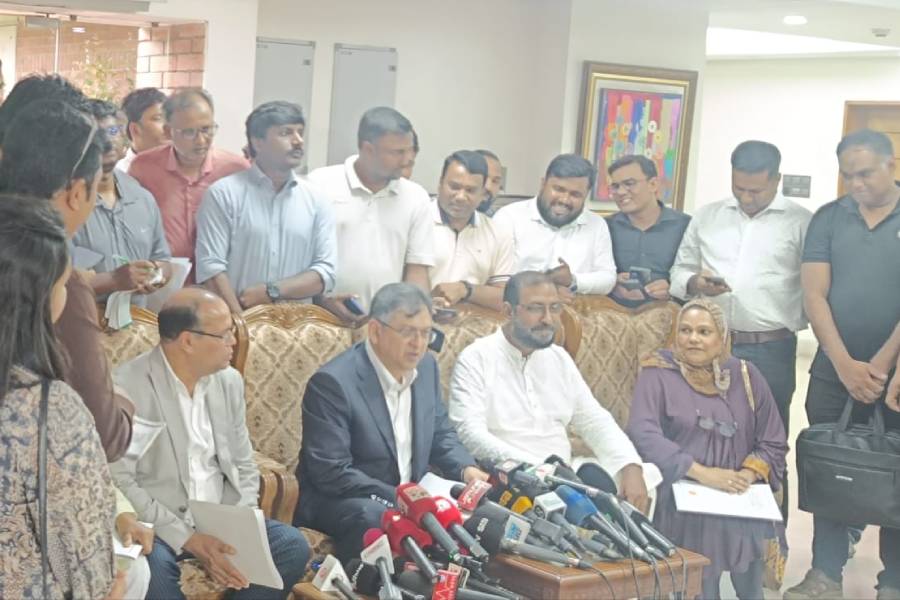
Published :
Updated :

BNP Standing Committee Member Salahuddin Ahmed on Wednesday said his party has extended the highest cooperation to achieve a national consensus on reform initiatives.
“We have so far provided maximum cooperation to build a national consensus,” he said while briefing reporters after the eighth day of the second-round dialogue between the National Consensus Commission and the political parties at the Foreign Service Academy in the capital.
Salahuddin said the BNP has constructively engaged with the reform proposals on various issues. “From the very first day, we’ve agreed on many issues,” he said.
Focusing on his party’s support to different reform proposals, he said BNP agreed with others to change the article 70 of the constitution in bid to ensure that MPs can freely vote even other than some specific bills including finance money bills and no-confidence motions.
About the parliamentary committees, he said the BNP proposed that key oversight committees like the Public Undertakings Committee, Public Accounts Committee, Privileges Committee, and Estimates Committee should be chaired by opposition MPs. Besides, opposition MPs should be picked up proportionately for the chairmanship of other parliamentary committees.
Salahuddin said the BNP agreed to a proposal to slap a 10-year cap for any person to serve as Prime Minister in their lifetime. “We’ve endorsed that no person can serve as the Prime Minister for a maximum of 10 years in their lifetime,” he said.
Dismissing speculations that BNP is unwilling to compromise on reform issues, he said BNP gave detailed responses to all 131 recommendations from the Constitutional Reform Commission.
“We’ve agreed with most and opposed only a few,” he said, adding that other parties have not submitted such a comprehensive response.
He said BNP wants a strong, functional Ombudsman office with a dedicated secretariat and expanded legal authority.
The BNP leader said his party agreed with almost 100 percent recommendations from the Anti-Corruption Commission (ACC) reform commission. “We’ve expressed a different views regarding one out of 47 recommendations,” he said.
Out of 208 recommendations from the Public Administration Reform Commission, BNP agreed with 127 and partially disagreed with 16. It outright opposed only a few impractical ideas, like forming provinces, he added.
About Judicial Reform, BNP supported 62 of 89 recommendations, he said adding that his party expressed support for full independence of the judiciary but agreed partially on a few procedural issues, such as prosecution services.
Regarding electoral reform, he said BNP agreed with more than 140 out of the 243 election-related proposals. The party raised objections to other recommendations as the electoral reform report contained some recommendations hypothetical, repetitive or conflicting with the constitutional independence of the Election Commission.
About Wednesday's reform discussion, Salahuddin reaffirmed BNP’s stance for restoration of the 90-day caretaker system to conduct the national election, with a potential one-month extension in case of emergencies (act of God).
Defying proposals from some political parties for holding both the national election and all local government elections under a 4-month caretaker government, he said “If caretaker governments are to oversee all local elections, they’ll have to stay for five years, which is absurd.”
He said the local government elections are held at four levels—Union Parishad or Municipality, Upazila, District and City Corporation— at least six months is required for holding elections in each level. Since their terms expire at different times, it can’t be a function of the caretaker government.
About the demarcation of the parliamentary constituencies, the BNP leader said consensus was achieved over a proposal for the formation of a special committee for delimitation of constituencies. “It is I who placed the proposal,” he said.
As per the proposal, a clause will be incorporated in the Constitution allowing formation of a specialised committee after each census for delimitation purposes.
However, Nayeb-e-Ameer of Bangladesh Jamaat-e-Islami Syed Abdullah Muhammad Taher at a press briefing said his party wants the local government elections would be held under a 4-month caretaker government.
About Wednesday's talks, Vice-Chairman of the National Consensus Commission Professor Ali Riaz at a press briefing said there is no disagreement among political parties regarding the reinstatement of the caretaker government system.
He, however, said the structure of the caretaker government will be discussed later to reach an agreement over it.
He said the parties agreed on taking both immediate and long-term measures for constituency delimitation.
As an immediate measure, an expert committee — comprising individuals with appropriate expertise —will be formed (or modified if already in place) with assistance from the Election Commission to determine parliamentary constituencies for the upcoming 13th National Parliamentary Election, based on the committee’s recommendations.
On long-term arrangements, Riaz said a provision will be added to the end of Article 119(1)(g) of the Constitution—after the word “and”—stating that “an expert committee will be formed by law” to revise parliamentary boundaries after every census or within a maximum of 10 years.
The structure and responsibilities of this committee will be defined by amending Section 8(3) of the National Parliament (Constituency Demarcation) Act, 2021, revised in 2025.
Representatives from 30 political parties, including BNP, Jamaat-e-Islami, National Citizens’ Party (NCP), took part in the dialogue.


 For all latest news, follow The Financial Express Google News channel.
For all latest news, follow The Financial Express Google News channel.